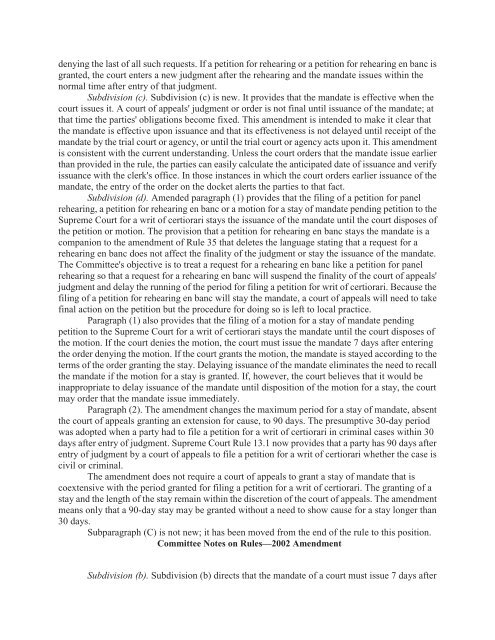Federal Rules of Appellate Procedure 2014-2015, 2014a
Federal Rules of Appellate Procedure 2014-2015, 2014a
Federal Rules of Appellate Procedure 2014-2015, 2014a
You also want an ePaper? Increase the reach of your titles
YUMPU automatically turns print PDFs into web optimized ePapers that Google loves.
denying the last <strong>of</strong> all such requests. If a petition for rehearing or a petition for rehearing en banc is<br />
granted, the court enters a new judgment after the rehearing and the mandate issues within the<br />
normal time after entry <strong>of</strong> that judgment.<br />
Subdivision (c). Subdivision (c) is new. It provides that the mandate is effective when the<br />
court issues it. A court <strong>of</strong> appeals' judgment or order is not final until issuance <strong>of</strong> the mandate; at<br />
that time the parties' obligations become fixed. This amendment is intended to make it clear that<br />
the mandate is effective upon issuance and that its effectiveness is not delayed until receipt <strong>of</strong> the<br />
mandate by the trial court or agency, or until the trial court or agency acts upon it. This amendment<br />
is consistent with the current understanding. Unless the court orders that the mandate issue earlier<br />
than provided in the rule, the parties can easily calculate the anticipated date <strong>of</strong> issuance and verify<br />
issuance with the clerk's <strong>of</strong>fice. In those instances in which the court orders earlier issuance <strong>of</strong> the<br />
mandate, the entry <strong>of</strong> the order on the docket alerts the parties to that fact.<br />
Subdivision (d). Amended paragraph (1) provides that the filing <strong>of</strong> a petition for panel<br />
rehearing, a petition for rehearing en banc or a motion for a stay <strong>of</strong> mandate pending petition to the<br />
Supreme Court for a writ <strong>of</strong> certiorari stays the issuance <strong>of</strong> the mandate until the court disposes <strong>of</strong><br />
the petition or motion. The provision that a petition for rehearing en banc stays the mandate is a<br />
companion to the amendment <strong>of</strong> Rule 35 that deletes the language stating that a request for a<br />
rehearing en banc does not affect the finality <strong>of</strong> the judgment or stay the issuance <strong>of</strong> the mandate.<br />
The Committee's objective is to treat a request for a rehearing en banc like a petition for panel<br />
rehearing so that a request for a rehearing en banc will suspend the finality <strong>of</strong> the court <strong>of</strong> appeals'<br />
judgment and delay the running <strong>of</strong> the period for filing a petition for writ <strong>of</strong> certiorari. Because the<br />
filing <strong>of</strong> a petition for rehearing en banc will stay the mandate, a court <strong>of</strong> appeals will need to take<br />
final action on the petition but the procedure for doing so is left to local practice.<br />
Paragraph (1) also provides that the filing <strong>of</strong> a motion for a stay <strong>of</strong> mandate pending<br />
petition to the Supreme Court for a writ <strong>of</strong> certiorari stays the mandate until the court disposes <strong>of</strong><br />
the motion. If the court denies the motion, the court must issue the mandate 7 days after entering<br />
the order denying the motion. If the court grants the motion, the mandate is stayed according to the<br />
terms <strong>of</strong> the order granting the stay. Delaying issuance <strong>of</strong> the mandate eliminates the need to recall<br />
the mandate if the motion for a stay is granted. If, however, the court believes that it would be<br />
inappropriate to delay issuance <strong>of</strong> the mandate until disposition <strong>of</strong> the motion for a stay, the court<br />
may order that the mandate issue immediately.<br />
Paragraph (2). The amendment changes the maximum period for a stay <strong>of</strong> mandate, absent<br />
the court <strong>of</strong> appeals granting an extension for cause, to 90 days. The presumptive 30-day period<br />
was adopted when a party had to file a petition for a writ <strong>of</strong> certiorari in criminal cases within 30<br />
days after entry <strong>of</strong> judgment. Supreme Court Rule 13.1 now provides that a party has 90 days after<br />
entry <strong>of</strong> judgment by a court <strong>of</strong> appeals to file a petition for a writ <strong>of</strong> certiorari whether the case is<br />
civil or criminal.<br />
The amendment does not require a court <strong>of</strong> appeals to grant a stay <strong>of</strong> mandate that is<br />
coextensive with the period granted for filing a petition for a writ <strong>of</strong> certiorari. The granting <strong>of</strong> a<br />
stay and the length <strong>of</strong> the stay remain within the discretion <strong>of</strong> the court <strong>of</strong> appeals. The amendment<br />
means only that a 90-day stay may be granted without a need to show cause for a stay longer than<br />
30 days.<br />
Subparagraph (C) is not new; it has been moved from the end <strong>of</strong> the rule to this position.<br />
Committee Notes on <strong>Rules</strong>—2002 Amendment<br />
Subdivision (b). Subdivision (b) directs that the mandate <strong>of</strong> a court must issue 7 days after


















